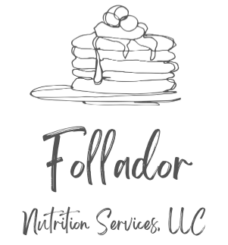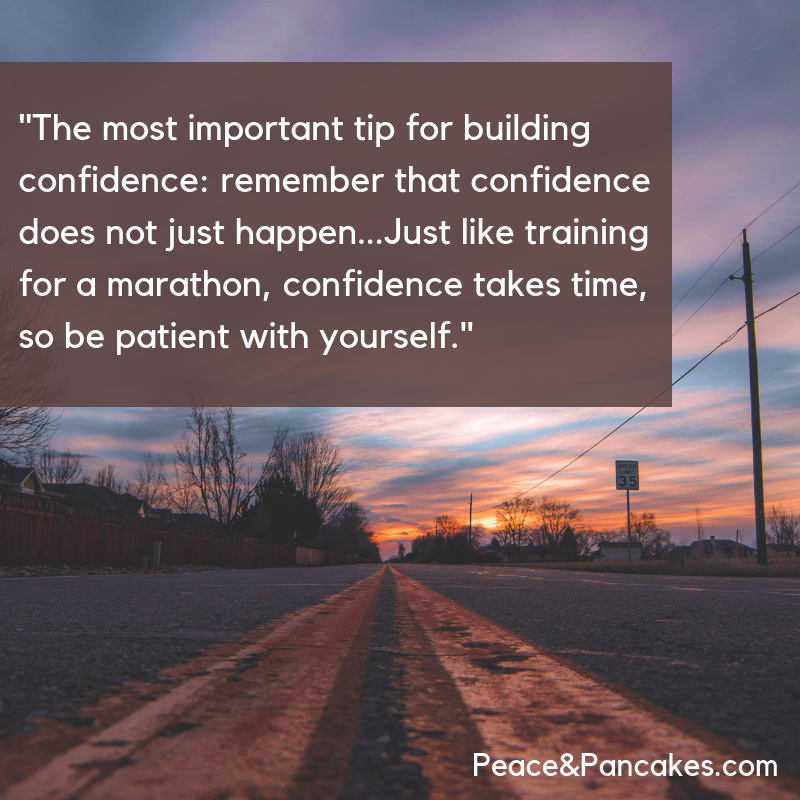Insecure about your knowledge or skills as a dietitian? Unsure if you’re good enough for the job you landed? Feeling inadequate because you don’t think you’re as smart/outgoing/experienced as your fellow interns or mentors?
I feel you! I used to believe confidence was an innate quality (i.e., confident people are magical beings that enter the world without an ounce of insecurity). My dietetics career thus far has slapped me with the reality that confidence is a skill that takes time to build. While it’s a journey that looks different for everyone, the following tips are ones that I find useful for laying a solid foundation for confidence.
Be patient.
The most important tip for building confidence: remember that confidence does not just happen. Confidence comes after many mistakes, after exhausting workdays topped off with long nights of studying, after being thrown into situations that you have no idea how to handle, after feeling tiny and inadequate because you didn’t have the answer right away. Just like training for a marathon, confidence takes time, so be patient with yourself.
Be on time.
Being punctual is essential in making a good impression. It’s also is one of the easiest factors you can control to decrease nerves and stress so you can start each day on a good note. If you’re early, even better! It gives you a chance to take a few deep breaths and gather your thoughts for the day.
Take notes.
For me, writing things down is one of the simplest and most effective ways to learn. I had a notebook with me at all of my internship rotations and wrote down any information I didn’t want to forget. Most importantly, I took note of feedback from preceptors/mentors and read through it regularly. Writing down and re-reading information prevented me from repeating mistakes and helped me fine-tune my skills that much faster.
Be prepared.
Athletes practice for hours each day so that they can rely on muscle memory to pull them through in high-pressure moments. Apply the same theory to your dietetics practice. Build a solid foundation for your skills by re-reading notes or textbook chapters on the topic of upcoming rotations or job opportunities. Don’t take for granted any materials a preceptor or supervisor provides you, whether they’re considered “required” or not. When I found myself in stressful situations, the information I needed came to me quickly because I had studied it thoroughly.
Make cheat sheets.
A great tool that I still use to stay prepared and survive stressful situations is making cheat sheets. Topics include anything from selecting enteral formulas to questions to ask during counseling sessions. Cheat sheets streamline my practice and help me relax because I know that I have a resource to reference if I feel stuck.
Ask for help.
Let go of the notion that you must know everything or you are somehow failing if you need help. I ask for help daily and expect that I always will; there is no way you can know everything, and that’s okay! Asking questions helps you learn and grow and shows that you are motivated to improve.
Tend to your mental health.
I’ve always tended to beat myself up after even the simplest mistakes, which isn’t instrumental for building confidence. I opened up to my fellow interns, friends, and parents throughout my internship (and still do!) when I was feeling insecure and stressed. Did it fix the situation? No, but it took some of the weight off of my shoulders. If you have the resources, seeking professional help is 100% worth it. Additionally, relaxing and having fun will help you focus and perform better at your rotations, so make it a priority to do activities that you enjoy regularly. It could be as simple as going out for frozen yogurt, catching a movie, or baking cookies (or, like, watching The Office…again).
Remember that you are not your mistakes or your accomplishments.
Feeling down because you made a mistake or you haven’t accomplished a goal you set for yourself? Please remember that your life is much, much, much more than your mistakes or accomplishments. As a therapist explains in this article, “People get hooked on the ordinary, it’s always what is most missed, loved and appreciated about a person.” You are a valuable, loved person for who you are, not what you have/have not accomplished. Instead of beating yourself up, focus on what is going right. Make a list of positive feedback you’ve received and anything you’re grateful for. You may find that your list outweighs the guilt you feel for a tiny mistake you made while writing a clinical note or giving a presentation.
Cut back on comparison.
Feel free to be inspired by others, but don’t put yourself down because you’re not where someone else is. Everyone has different experiences that provide them with their unique skills and knowledge. Continue to work hard on improving yourself, and remember that everyone has insecurities and doubts. Instead of comparing yourself to another person, use them as a resource. For example, if you admire a colleague’s public speaking skills, ask them for tips on improving yours. In addition to learning, you may discover that they admire something about you.
Just keep going.
Bad days happen. Mistakes happen. People not liking you happens. Rejection happens. Your mistakes, failures, and pain make you stronger and smarter. Just keep going.

